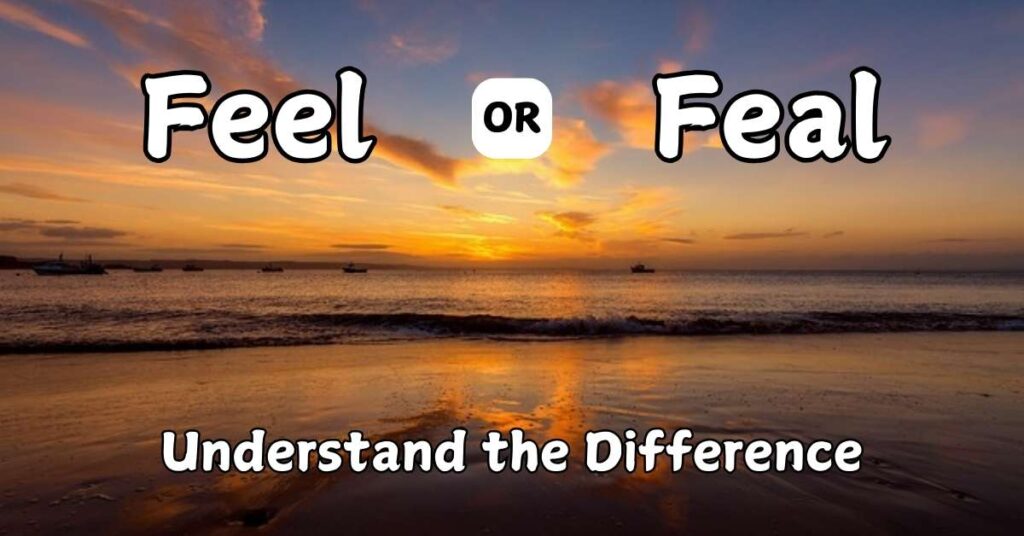Feel or feal which one should you use? While they may sound alike, these two words carry different meanings and usages that can lead to confusion. Understanding the distinction between feel and feal is essential for clear communication in English.
Feel is a versatile word, commonly used to express emotions or physical sensations, while feal is an archaic term denoting loyalty or faithfulness.
This article will explore the definitions, origins, and contexts of both words, providing you with examples and insights that will enhance your writing and speaking skills. By the end, you’ll confidently know when to use feel and feal in your everyday conversations.
Quick Summary
Feel is a common word used to express emotions or physical sensations, while feal is an archaic term that means loyal or faithful. Knowing when to use these words can enhance your writing and speaking skills, making your communication more effective.
The Difference Between Feel or Feal

The word feel serves as both a verb and a noun. As a verb, it describes the act of perceiving sensations or emotions.
For example, you might say, “I feel happy,” indicating an emotional state. As a noun, it refers to the sensation itself, like in the phrase “the feel of soft fabric.” On the other hand, feal functions solely as an adjective.
It is rarely used today but historically described someone who was loyal or faithful. For instance, in medieval texts, a knight might be described as “feal” to emphasize his loyalty to his lord.
Word Comparison Table
| Word | Part of Speech | Meaning | Common Usage |
| Feel | Verb, Noun | To perceive or experience emotions | Everyday language |
| Feal | Adjective | Loyal, faithful | Rarely used, poetic |
Origins of the word Feel
The word “feel” originates from the Old English term “fēlan,” first recorded before the 12th century. It is related to the Old High German “fuolen,” the Old Norse “fālma,” and the Latin “palpare.” This etymology reflects its consistent connection to sensory perception and emotional experience throughout its evolution.
Feel: Definition and Usage

The word feel has multiple meanings and uses in modern language. As a verb, it conveys actions related to sensory perception and emotional states. For example, you might say “I feel cold” to describe a physical sensation or “I feel sad” to express an emotional state.
As a noun, it refers to the quality of a sensation or emotion. For instance, “The feel of the ocean breeze is refreshing.”
Feel Meanings
Feel encompasses various meanings related to sensory experiences and emotional states. It can refer to physical sensations like touch or temperature and emotional perceptions such as joy or sadness.
“Feel” Uses
You can find feel used in countless contexts from everyday conversations about emotions to literary descriptions of sensations. Writers often use it to create vivid imagery that resonates with readers.
5 Feel Uses in Literature?
Literature showcases various uses of feel that evoke strong imagery and emotion. For example:
- In poetry, an author might write about feeling the warmth of sunlight on their skin.
- A novelist may describe a character’s inner turmoil by detailing how they feel lost and alone.
- Writers often use simple phrases like “I feel happy” to connect with young readers.
- Characters might express their feelings through introspective monologues.
- Modern songs frequently explore themes of love and heartbreak using the word feel.
Synonyms of Feel
There are many synonyms for feel, which can enhance your vocabulary and writing style:
Synonyms of Feel in (verb)
- Sense
- Perceive
- Experience
- Touch
- Detect
- Discern
- Grasp
- Comprehend
- Realize
- Understand
Synonyms of Feel in (noun)
- Emotion
- Sensation
- Impression
- Vibe
- Atmosphere
- Mood
- Sentiment
- Affection
- Passion
- Response
Feal: Definition and Usage

Feal is an adjective that signifies loyalty or faithfulness. Historically valued, this term is rarely used in modern language, often appearing only in poetic or literary contexts, where it emphasizes steadfastness and devotion among characters or individuals.
Feal Meanings
The meanings of feal center on loyalty and fidelity, embodying traits that represent steadfastness and unwavering commitment in relationships, often reflecting deep emotional bonds and trust.
“Feal” Uses
Feal appears in historical texts and poetry, often highlighting themes of loyalty and devotion. Its usage evokes a sense of tradition, connecting readers to the values of fidelity and allegiance from the past.
5 Feal Uses in Literature?
In literature, authors may use feal to convey deep loyalties among characters:
- A knight’s feal devotion to his king.
- A character’s feal friendship that withstands trials.
- Descriptions of feal love that endures through hardships.
- Poetic references to feal hearts that never waver.
- Historical accounts emphasizing feal service during battles.
Synonyms of Feal
Synonyms for feal focus on loyalty-related concepts, emphasizing traits like faithfulness, devotion, and steadfastness in relationships.
Synonyms of Feal in (adj)
- Loyal
- Faithful
- Devoted
- Steadfast
- True
- Constant
- Reliable
- Trustworthy
- Unwavering
- Allegiant
Synonyms of Feal in (verb)
While there are fewer direct synonyms for feal, some archaic terms include:
- Conceal
- Hide
- Cover
- Protect
- archaicShield
- Guard
- Safeguard
- Preserve
- Defend
- Secure
Side by Side Comparison
| Feature | Feel | Feal |
| Part of Speech | Verb, Noun | Adjective |
| Meaning | perceive emotions or phiphysical sensations | Loyal, faithful |
| Common Usage | Everyday language, literature | Rarely used, primarily in historical or poetic contexts |
| Examples | “I feel happy.” “The feel of the fabric is soft.” | “He is a feal knight.” “Her feal devotion impressed everyone.” |
| Origin | Old English (fēlan), Proto-Germanic | Old French (feal), Latin |
| Context | Used widely in modern conversations | Used mainly in literary or historical contexts |
| Synonyms | Sense, perceive, experience | Loyal, faithful, steadfast |
Everyday Usage Examples

Feel is commonly used to express emotions and sensations. For instance, people might say, “I feel tired,” or “The fabric has a nice feel.” Such expressions help convey personal experiences and foster connections in communication.
Feel Example
Example of feel in a sentence is: “I feel grateful for my friends.” This illustrates how the word conveys an emotional state, enhancing personal expression in everyday language.
Feel Examples in Context
Feel can be used as follows: “She feels the cool breeze,” or “They feel a sense of joy.” These examples highlight its versatility in expressing sensations and emotions.
3 Examples of Feel as a Verb
- “I feel excited about the upcoming vacation.”
- “He feels nervous before giving a presentation.”
- “They feel a strong connection to their hometown.”
3 Examples of Feel as a Noun
- “The feel of the soft blanket is comforting.”
- “The overall feel of the café is warm and inviting.”
- “Her words gave me a positive feel about the project.”
Feal Example

Example of feal in a sentence is: “The feal knight remained loyal to his king.” This illustrates the word’s use in describing steadfast loyalty and commitment in historical contexts.
Feal Examples in Context
Feal can be used as follows: “Her feal support during tough times was invaluable,” or “The feal warriors fought bravely for their lord.” These examples emphasize loyalty and dedication.
3 Examples of Feal as a Verb
- “He feals a deep sense of duty to protect his family.”
- “The knight feals his allegiance to the crown.”
- “She feals her responsibility to uphold the values of her community.”
3 Examples of Feal as a Noun
- “His loyalty was a true feal to the king, reflecting unwavering fidelity.”
- “The feal shown by the soldiers during the battle was commendable.”
- “A feal heart is essential in times of crisis, showcasing true dedication.”
3 Examples of Feal as a adjective
- “The feal knight defended his lord with unmatched bravery.”
- “Her feal devotion to her friends was evident in every action she took.”
- “He made a feal promise to stand by his family through thick and thin.”
You May Also Like: Copys or Copies: Which One is Correct?
Common Mistakes

Many people confuse these two words due to their similar sounds but different meanings and usages.
One common mistake occurs when someone uses feal instead of feel, particularly when expressing emotions or sensations.
Another mistake involves using both words interchangeably without understanding their distinct contexts.
5 Tips for Avoiding Common Mistakes
To avoid confusion between these two words:
- Always consider the context before choosing between feel and feal; remember that feel is more common and versatile.
- Use feal primarily when discussing historical themes or literary contexts related to loyalty.
- Familiarize yourself with synonyms for both words; this will enhance your vocabulary significantly.
- Read sentences aloud; this will help ensure they sound correct.
- Practice writing sentences using both words correctly; this will reinforce your understanding.
You May also Like: Litre or Liter: Which One is Correct?
FAQs: Feel or Feal
What are the 3 forms of feel?
The three forms of “feel” are feel, felt, and feeling.
Is it correct to say “I feel for you”?
Yes, “I feel for you” is a correct expression of empathy or sympathy.
How do you spell “feel better”?
The correct spelling is “feel better,” often used to wish someone a quick recovery.
Do I feel like correct grammar?
Yes, “Do I feel like” is grammatically correct when followed by an appropriate complement, such as an activity or emotion.
Conclusion
Understanding the differences between feel or feal is essential for effective communication. While feel is a versatile word used to express emotions and sensations in everyday language, feal carries a historical significance related to loyalty and faithfulness.
By mastering the correct usage of these terms, you can enhance your writing and speaking skills. Whether you’re conveying personal feelings or discussing themes of loyalty in literature, knowing when to use feel and feal will enrich your communication and deepen your connections with others.
Related Post: Tomorrow or Tommorrow: What’s the Difference?

